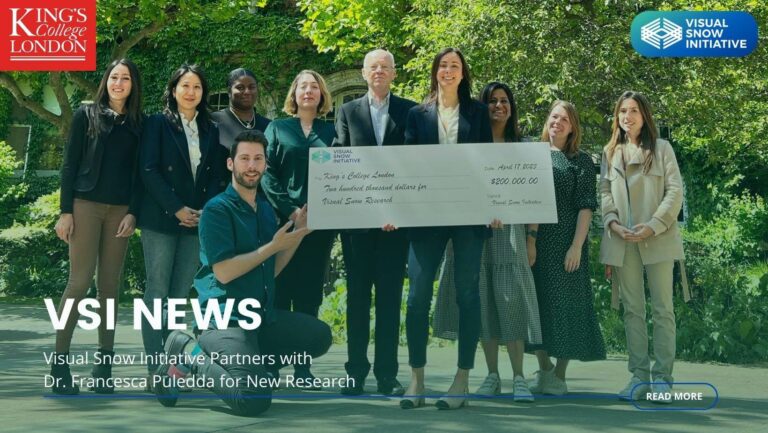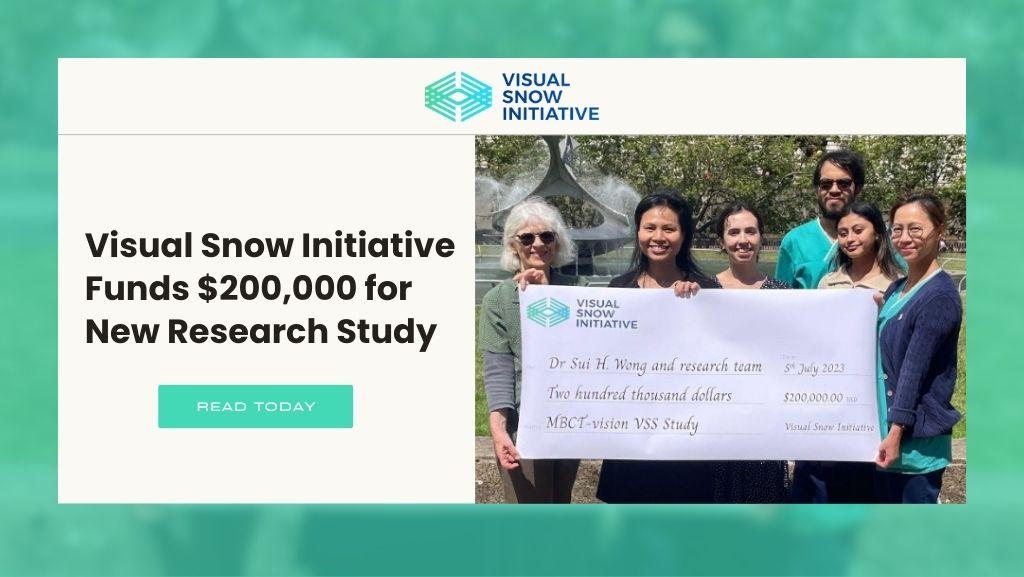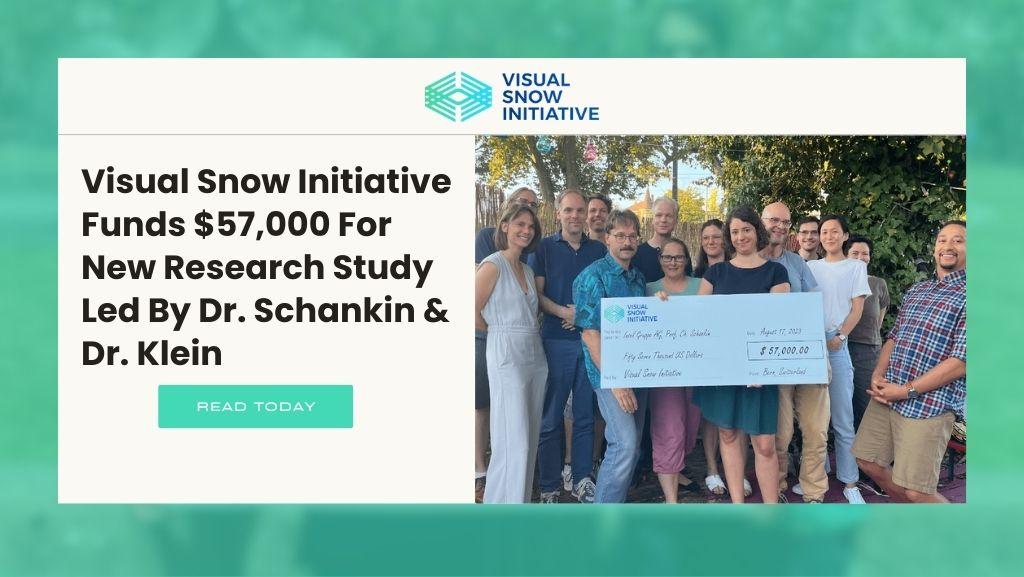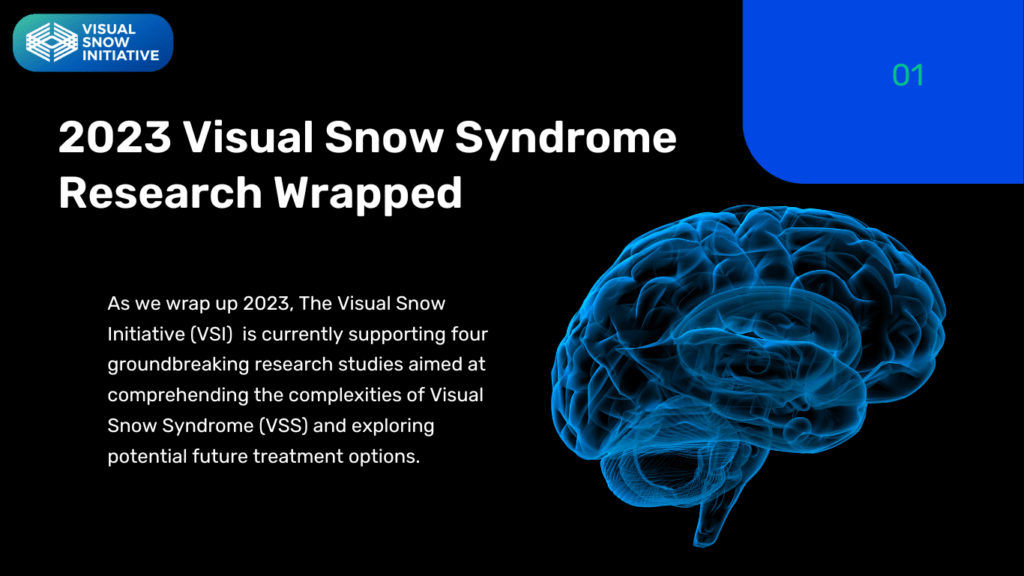The Visual Snow Initiative (VSI) is proud to support four groundbreaking research studies aimed at comprehending the complexities of Visual Snow Syndrome (VSS) and exploring potential future treatment options.
Research #1 (Ongoing)
VSS Biomarker Identification
Potential Pharmacological Interventions
Pathophysiology
VSI is collaborating with Dr. Francesca Puledda from King’s College London on research focused on identifying biomarkers in VSS. Thus far, Dr. Puledda and her team’s findings have identified the first-ever possible biological basis of the condition. Their novel approach revealed that the patterns of activity in two brain chemical systems, glutamate and serotonin, are different in people with VSS compared to those without the condition. (For more information, please see the study in Annals of Neurology: “Abnormal Glutamatergic and Serotonergic Connectivity in Visual Snow and Migraine with Aura”) Dr. Puledda and her team will be continuing their collaborative work with VSI to further research measurable indicators that could aid in the diagnosis and treatment of VSS. Based on the findings, the potential for pharmacological interventions can be explored. Dr. Puledda’s team employs state-of-the-art neuroimaging techniques, including a powerful 7-Tesla MRI, to uncover the underlying brain metabolism and connectivity changes in VSS.

Research #2 (Completed) & #3 (Upcoming)
MBCT-Vision (MBCT To Treat VSS Symptoms)
Changing The Brain’s Visual Network
Altering Neural Pathways
Neurologist and Neuro-ophthalmologist, Dr. Sui Wong, will continue investigating MBCT (Mindfulness-Based Cognitive Therapy) as a treatment for VSS in collaboration with VSI and Guy’s and St Thomas’ NHS Foundation. Dr. Wong’s efforts mark the first time MBCT interventions have ever been researched in the VSS patient population.
In Dr. Wong’s recently published feasibility study, partially funded by VSI, MRI scans indicated that MBCT (Mindfulness-Based Cognitive Therapy) can improve VSS symptoms and was correlated with a change in the brain’s visual network.
For more information, please see the study in the Journal of Neuro-Ophthalmology
Dr. Wong has customized MBCT for VSS symptoms, coining the term, “MBCT-vision.” It can potentially improve both visual and non-visual symptoms.
The study’s outcome revealed not only symptom reduction but also measurable changes in brain activity, offering new hope for VSS treatment.
Expanding upon her previous study, Dr. Wong and VSI are working on another study together: a Randomized Control Trial (RCT) that will test how MBCT/MBCT-vision can improve the brain’s visual network to filter out the unwanted images to improve or resolve symptoms of VSS. She will also be taking blood samples from study participants that could potentially reveal anomalies in the VSS patient populations.
For more information on study participation, please visit please visit the MBCT-vision website or contact Dr. Wong and her research team at: [email protected].

Research #4 (Upcoming)
Neuromodulation for VSS
EEG, Transcranial alternating currents stimulation
Targeted Treatment Exploration
In collaboration with Dr. Schankin and Dr. Klein from Bern University Hospital, VSI is supporting a study exploring neuromodulation for VSS. This research investigates how transcranial alternating currents stimulation (tACS) can modulate overactive neural networks in the brain, potentially leading to new treatment options for VSS. Dr. Schankin and Dr. Klein’s techniques aim to reduce various common VSS symptoms, including visual snow/static, palinopsia, entoptic
phenomena, photophobia, and nyctalopia.
The underlying idea behind VSS is that multiple neural networks in the brain remain overly active, bombarding the visual system with an excess of information. However, tACS offers the possibility of modulating these networks. Dr. Schankin and Dr. Klein’s primary goal is to pinpoint the specific areas in the brain where something is not functioning as it should. To achieve this, they are blending various diagnostic markers with a treatment-oriented methodology.
Their study will begin with comprehensive visual test, MRI, and electroencephalogram (EEG) measurements. Dr. Schankin and Dr. Klein are particularly interested in observing how this stimulation affects VSS symptoms, influences performance in tasks, and whether there are alterations in EEG patterns in patients with VSS.
Dr. Schankin and Dr. Klein discuss their work and collaboration with VSI in our latest video series.

More Information
Stay tuned for more updates on these VSS research studies via our website, newsletter, and social media channels. You can help make a positive difference in the lives of people affected by VSS worldwide. Thank you so much for your support.


